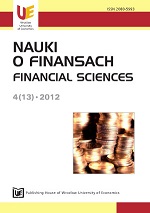Dilemmas of imf surveillance: some unpleasant facts in the world of currency spats
Dilemmas of imf surveillance: some unpleasant facts in the world of currency spats
Author(s): Michał JurekSubject(s): Economy
Published by: Wydawnictwo Uniwersytetu Ekonomicznego we Wrocławiu
Keywords: International Monetary Fund; surveillance over exchange rate policies
Summary/Abstract: This article attempts to analyze the impact of the 2007 Decision on Bilateral Surveillance, adopted by the Executive Board of the International Monetary Fund on June 15th 2007, which defined the scope of surveillance and its modalities anew, thus reviewing the 1977 Decision on Exchange Rate Policy Surveillance and bringing together links between exchange rate policies and domestic policies. The 2007 Decision broadened the area of the Fund’s surveillance activities, however, a full implementation of this decision was found difficult due to a serious setback, as the 2007 Decision in practice gave the IMF neither the tools nor a code of conduct which would allow fulfilling the Fund’s mandate to promote the stability of exchange rate arrangements. Thus, the International Monetary Fund still remains the ‘forum of multilateral monologue’, systematically losing control over the exchange rate policies of its members. The low effectiveness of the IMF surveillance over exchange rate policies undermines the international monetary system because of government interference in the foreign exchange market in the aftermath of the current global financial crisis. Taking this into consideration, this paper indicates ways in which the Fund might increase surveillance effectiveness. The main idea is that, in the short-term, the IMF should be more sharply focused on multilateral surveillance. However, in the long-term the amendment of the Articles of Agreement is necessary, as only precisely defining member countries’ obligations concerning exchange rate policy, as well as matters concerning this very policy which fall within and exceed the competence of the IMF may enable the Fund to prevent ‘currency wars’ among competing countries and the destabilization of exchange arrangements worldwide.
Journal: Nauki o Finansach
- Issue Year: 2012
- Issue No: 4 (13)
- Page Range: 97-114
- Page Count: 18
- Language: English

